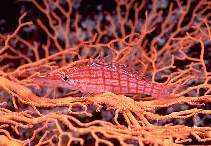| Family: |
Cirrhitidae (Hawkfishes) |
| Max. size: |
13 cm TL (male/unsexed) |
| Environment: |
reef-associated; marine; depth range 10 - 100 m, non-migratory |
| Distribution: |
Indo-Pacific: Red Sea and South Africa (Ref. 11228) to the Hawaiian Islands, north to southern Japan, south to New Caledonia. Eastern Pacific: Gulf of California to northern Colombia and the Galapagos Islands (Ref. 9289). |
| Diagnosis: |
Dorsal spines (total): 10-10; Dorsal soft rays (total): 13-13; Anal spines: 3-3; Anal soft rays: 7-7. Description: Characterized by white color with pattern of red stripes and bars; lower 5-6 pectoral rays unbranched; greatly elongate and pointed snout; absence of palatine teeth; coarsely serrate posterior margin of preopercle; elongated body, greatest depth 4.4-4.6 in SL (Ref. 90102). |
| Biology: |
Inhabits steep outer reef slopes exposed to strong currents where it lives in large gorgonians and black corals (Ref. 3921). Benthic (Ref. 58302). Common below 25 m (Ref. 90102). Feeds on small benthic or planktonic crustaceans. The suggestion that this species lays demersal eggs (Ref. 3921) is questionable. Pelagic spawning has been observed for this species from field observations (Ref. 26305). Monogamous (Ref. 52884), strongly territorial (Ref. 26305). Uncommon to rare in most areas (Ref. 9710). |
| IUCN Red List Status: |
Least Concern (LC); Date assessed: 03 March 2015 Ref. (130435)
|
| Threat to humans: |
harmless |
Source and more info: www.fishbase.org. For personal, classroom, and other internal use only. Not for publication.

